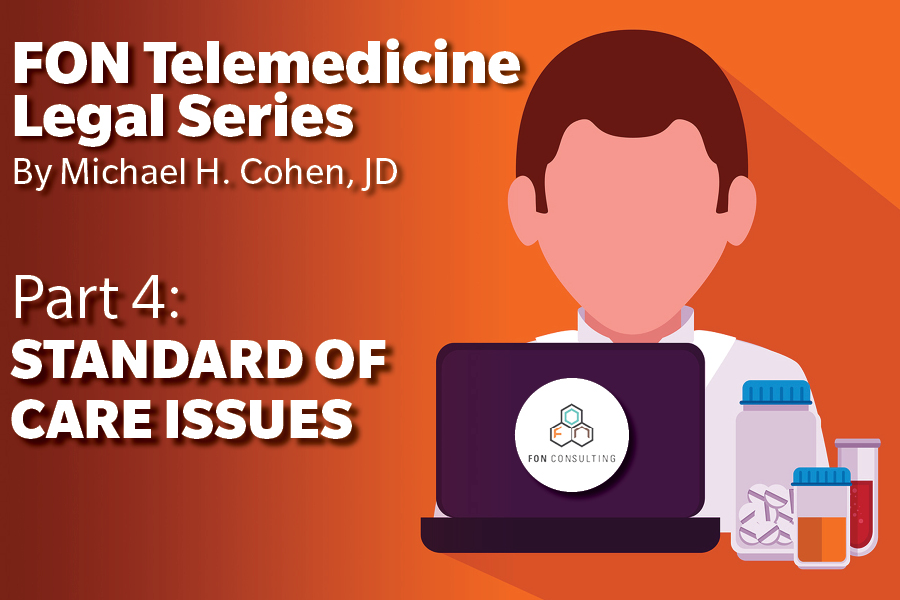7-Part Telemedicine Legal Series—Part 4: Standard of Care Issues

In this Series:
Introduction
Part 1: Practice Issues
Part 2: Licensing Issues
Part 3: e-Prescribing
Part 4: Standard of Care Issues
Part 5: HIPAA Issues
Part 6: Mobile Medical Apps
Part 7: Unlicensed Practice, Fee-Splitting, and other Legal Hazards
Conclusion
How do healthcare practitioners handle standard of care issues when diagnosing and treating from a distance?
Standard of Care Identical
The key rule is that the standard of care in telemedicine is identical to the standard of care in an in-person office visit.
For example, the Virginia Board of Medicine, in its policy statement on telemedicine, states:
“These guidelines should not be construed to alter the scope of practice of any health care provider or authorize the delivery of health care services in a setting, or in a manner, not authorized by law. In fact, these guidelines support a consistent standard of care and scope of practice notwithstanding the delivery tool or business method used to enable practitioner-to-patient communications.”
The Virginia Board of Medicine emphasizes that practicing medicine by telemedicine imposes the same general obligations on the physician as practicing in person:
It is the expectation of the Board that practitioners who provide medical care, electronically or otherwise, maintain the highest degree of professionalism and should:
- place the welfare of patients first;
- maintain acceptable and appropriate standards of practice;
- adhere to recognized ethical codes governing the applicable profession;
- adhere to applicable laws and regulations;
- in the case of physicians, properly supervise non-physician clinicians when required to do so by statute; and
- protect patient confidentiality.
No differentiation is made between an in person and a tele-visit.
Enjoying this article? Subscribe and get our latest, delivered straight to your inbox.
Similarly, Florida’s Telemedicine Practice Standards state that “the standard of care remains the same regardless of whether a Florida licensed physician or physician assistant provides health care services in person or by telemedicine.”
Evaluation and Treatment Through Telemedicine
Virginia, like some other states, emphasizes the need to adhere to the standard of care when discussing evaluation and treatment of the patient through telemedicine:
“A documented medical evaluation and collection of relevant clinical history commensurate with the presentation of the patient to establish diagnoses and identify underlying conditions and/or contra-indications to the treatment recommended/provided must be obtained prior to providing treatment, which treatment includes the issuance of prescriptions, electronically or otherwise. Treatment and consultation recommendations made in an online setting, including issuing a prescription via electronic means, will be held to the same standards of appropriate practice as those in traditional, in-person encounters. Treatment, including issuing a prescription based solely on an online questionnaire, does not constitute an acceptable standard of care.”
(bold added)
Not only must standard of care be equally met, whether the care is provided in person or remotely, but the Board warns against telemedicine ‘shortcuts’ such as basing a prescription solely on an online questionnaire.
Informed Consent
One aspect of ensuring that the standard of care has been met is to make sure the patient receives proper informed consent.
Informed consent means communication to the patient as to the risks and benefits of a recommended course of treatment and all reasonable and feasible material alternatives.
Once again, referring to Virginia’s statement on telemedicine, appropriate informed consent should include such items as:
- identification of the patient, the practitioner, and the practitioner’s credentials;
- types of activities permitted using telemedicine services (e.g., prescription refills, appointment scheduling, patient education, etc.);
- agreement by the patient that it is the role of the practitioner to determine whether or not the condition being diagnosed and/or treated is appropriate for a telemedicine encounter;
- details on security measures taken with the use of telemedicine services, such as encrypting date of service, password protected screen savers, encrypting data files, or utilizing other reliable authentication techniques, as well as potential risks to privacy notwithstanding such measures;
- hold harmless clause for information lost due to technical failures; and
- requirement for express patient consent to forward patient-identifiable information to a third party.
The Virginia Board mirrors many other states in simply applying medical-legal standards in their entirety, whether the encounter is in person or through an online or mobile platform.
Medical Record-Keeping
The medical record-keeping requirements do not vanish or change simply because the physician-patient encounter occurs through telemedicine.
As Virginia puts it:
“The medical record should include, if applicable, copies of all patient-related electronic communications, including patient-practitioner communication, prescriptions, laboratory and test results, evaluations and consultations, records of past care, and instructions obtained or produced in connection with the utilization of telemedicine services. Informed consents obtained in connection with an encounter involving telemedicine services should also be filed in the medical record.”
Informed consent should be documented in the medical record for telemedicine visits, just as it should be for in-person patient visits.
Conclusion
Increasingly, telemedicine is seen as an integral part of medicine with a seamless physician-patient relationship more virtual than physical. To ensure patients receive high quality treatment, state laws and medical board regulations require the standard of care in telemedicine reflect that of an in-person physician-patient encounter.
Contact the Michael H. Cohen Law Group for a telemedicine legal consult that fits your particular business model.
Reading this article does not create an attorney-client relationship with its author or with the Michael H. Cohen Law Group. This is an informational and educational piece; it does not constitute legal advice. If you’d like legal advice, consult an attorney for advice specific to your situation.
About FON
FON is a leading integrative health and medicine business development and strategy consulting firm. FON specializes in custom solutions for growing patient volume, developing programs, and increasing product sales. Our practical business models are driven by innovative marketing, clear messaging, and customer engagement via branded storytelling.
Contact us today to schedule a complimentary 30-minute consultation to discuss your business development or personal brand needs.
The Michael H. Cohen Law Group counsels health technology companies and providers on healthcare legal issues and FDA legal and regulatory matters. Legal counsel includes corporate and transactional healthcare matters, healthcare regulatory compliance, and healthcare litigation and dispute resolution. Attorney Michael H. Cohen is an internationally recognized author, speaker on healthcare law and FDA law, and expert in developing legal strategies for healthcare ventures, including integrative medicine, anti-aging and functional medicine, telemedicine and concierge medicine.






















